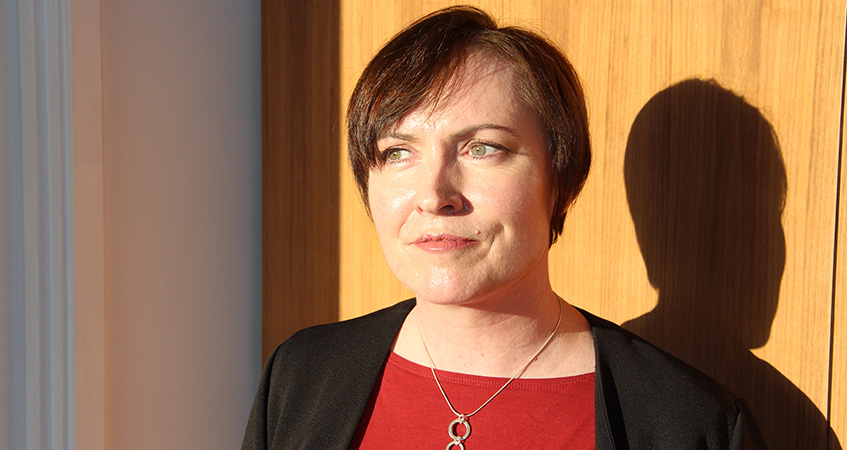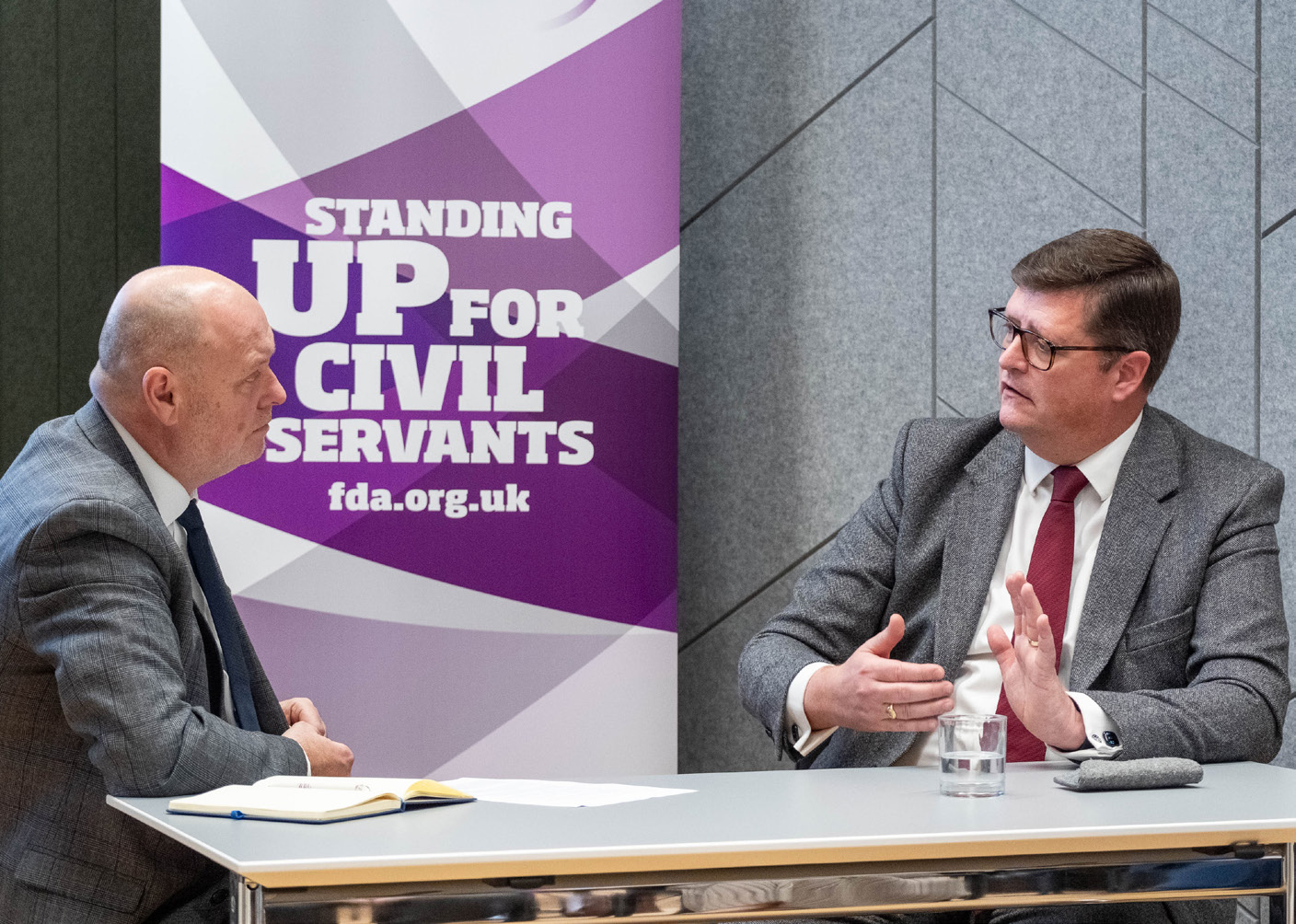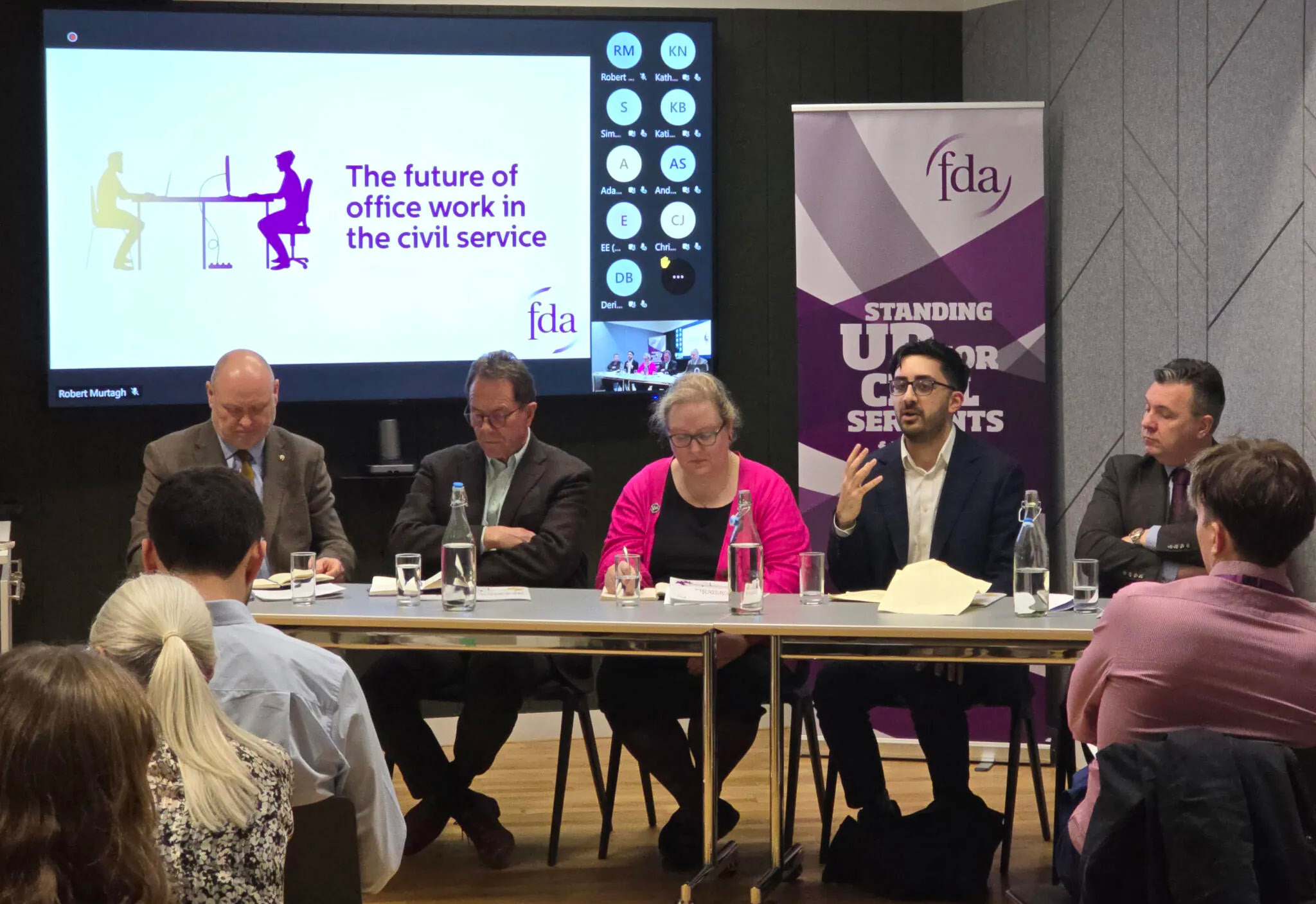There to be challenged
STUC General Secretary Roz Foyer speaks to Kay Hender about our responsibility to encourage others and why being in a trade union is like joining a gym.

Throughout her career, Roz Foyer has fought for change. After being sexually harassed in her first job in a Glasgow VAT office, she became a sexual harassment support officer for her union, while in her second job as a benefit centre telephonist. However, she didn’t feel empowered at the time: “In some respects… my reaction was to run away from the situation. I think it did start a sort of slow burn of ‘enough is enough and I can’t let this happen again’.”
After what she’d been through herself, Roz “really wanted to make sure that I could be the back-up for someone, I’d support them and create an environment that hadn’t been there when I’d initially had that experience”.
Roz credits her time at the benefits centre with her politicisation: “In those days we were literally listening to people running out of money on the phone as you were trying to put them through to a very understaffed department. I think in a lot of ways that gives you an impetus to want to speak up on behalf of others. Experience of working in that kind of role and hearing first-hand people in dramatic circumstances who weren’t getting the help they needed – that was definitely a driver.”
After discovering the benefits centre supports services were due to be privatised, Roz felt she had to speak up. The then-new Prime Minister Tony Blair came to Scotland for an appearance on Radio 4’s Any Questions?, and Roz – in her mid-twenties at the time – made sure she was in the audience. She asked why the existing staff weren’t being allowed to prove their efficiency in the public sector. After the recording, the PM’s secretary took her details and three weeks later, they heard they would be permitted to bid in-house. As Roz puts it, “everything got privatised except for the Scottish part.”
Wasn’t she nervous at publicly challenging the PM? “I was quite young and perhaps sometimes naivety can be a good thing because you don’t realise the magnitude of what you’re doing. It didn’t seem a big deal to me at the time… he was saying he had no ideology either way whether it was the private sector that delivered outsourcing or whether it was the public sector. So it seemed just natural to challenge him on that and ask why can’t we make an in-house bid? Because we’d been told we weren’t allowed. It just seemed very simple to me, that wasn’t what he’d said in his manifesto and his election campaign so it was there to be challenged.”
What advice would she give to someone who may not feel as emboldened to speak up? “I’ve learned that if you’re speaking up on behalf of a collective with a union behind you, you’re in a much safer position to do so… It completely changes the power dynamic, particularly on tricky issues.”
Roz’s time on union work increased, until she became a full-time trade union organiser. She remained within the union movement, as Assistant Secretary at the STUC, National Officer at TGWU before moving to Unite’s National Organising Department.
She was appointed as STUC General Secretary on 16th March 2020, perhaps the most turbulent, unpredictable period in most of our lifetimes. “My first day at work actually involved me sending all the STUC staff home and taking the decision to cancel our Congress, really going into crisis management mode immediately. I set up a home working model for the whole organisation and emergency meetings with the Scottish Government. This was before furlough had even kicked in so the unanswered questions, the panic, the lack of PPE for key groups or workers, all of these issues were in really sharp focus at the time.”
Roz admits that while “it was very much a baptism of fire, in some respects it was good because I didn’t have time to worry about the role of General Secretary or how was I going to do media interviews – we had to go completely off-piste and just do what was required and make some very quick decisions. And we were so busy and so caught up in that crisis management mode that there was no time to stop and worry about how I might feel or whether I had some sort of impostor syndrome, I just had to get on with it and that was a good thing.”
Like many others, Roz’s personal life was also thrown into chaos by the pandemic: “I had two kids who were suddenly in a situation where they needed to be home educated – myself and my husband were trying to carve aside some time to support them to do that. I have two elderly parents, one of whom has severe dementia, and the Glasgow care services were completely withdrawn for all but life and limb coverage for four months at the beginning of the pandemic.”
“I think it very much brought home for me that there are additional challenges that women sometimes face because of the way that society is constructed… I can remember bathing my mother one night and muttering away to myself, saying ‘I bet there’s no other General Secretary doing this’… Society is slowly changing but a lot of that burden of the unpaid work in the household does still fall on women.”
Roz also shares her appreciation of FDA members during the pandemic: “Just as the STUC has been in crisis mode, I think the civil service has been in crisis mode and I’m sure the pace at which they’ve had to work at with decisions, new guidance, laws, regulations, all sorts of things have had to be done at an unprecedented pace. I just want to acknowledge that it’s civil servants that have made so much of that happen and it doesn’t happen by magic – like other public sector workers that needs to be recognised and appreciated going forwards.
“You hear a lot about government at senior levels saying ‘we’ll have to bring in the private sector to show us how to deliver on this or create innovation in terms of public sector delivery’, and often I feel we should be looking at the fantastic skill set that people in our senior civil service roles already have and looking at how to use what we have in-house. Sometimes the dogma around private-good, public not-so-good really needs to be challenged because it doesn’t stack up.”
Roz does feel there are some irreversible changes from the pandemic: “We’re not going to go back to flying all over the country for meetings when we can do them by Zoom call in an hour. These things have changed forever and a lot of that is positive, particularly for women at work, it can make the workplace more accessible. But there are also ways that increased flexibility and digitalisation can be bad for workers: the way that people’s roles are monitored, the control systems and the way that that’s being automated, that can be quite intrusive if it’s intruding on your household time. Physically separating work life and home life can be really challenging for some people… There are lots of potential benefits but also lots of potential challenges with the new ways of working but one thing’s for sure, we’re not going backwards.”
As the world of work evolves, how can unions ensure they remain relevant? To Roz it’s “very simple – we really need to prioritise our own inclusivity and diversity and make it top of our agenda to keep relevant to all of our members, not just to dominant group of members that we might have in the movement.”
She also emphasises the importance of contact with members and potential members, which begins at the grassroots: “For most ordinary working members, the union is the local rep and it’s only as good as the local rep. The face of the local reps needs to be as diverse as the membership that we seek to represent, so all of the people in our workplaces. I think it is changing but I don’t think just because we have a few women at the top we can afford to be complacent.”
“The trade union is like a gym. You have to use the machinery and keep it well-oiled – you don’t just passively sit back and hope for change. You want people to feel like they’re part of a collective – if you’re a trade union that’s used to dealing with the small issues collectively, when a big issue comes along you’re already a well-oiled machine ready to spring into action. The difference between being in a union passively or actively is a massive, very important difference. What people want from a trade union is to know that somebody’s going to be there to listen to them, who’s in a similar situation to them, who understands their workplace and who can give them credible and wise advice.”
“We all have a duty to pull each other up”
Roz has had her fair share of being underestimated on the way to her current role: “There was that value system attached: ‘the man from the union’ is coming to see them instead of ‘that wee lassie’ that told them they’d have to get together and save themselves, which I think was a better lesson for them to learn. We all have a duty to pull each other up on that because we can all have those perceptions – we really need to make sure women have support networks they can go to.
She outlines a good example as “women speaking up at union conferences. The STUC women’s committee put a weekend school on before a big congress to give women a safe and supportive environment to practice public speaking skills… It’s just made such a difference in giving women that bit of confidence and encouragement that they may need and sometimes it’s as fundamental as that.
Roz admits that personally, “if it hadn’t been for other women in the movement supporting and encouraging me to go for the role of General Secretary, I don’t think that I would have automatically thought that that was something for me. I’d like to name-check Lynne Henderson from PCS, she did a fantastic campaign called ‘step aside brother’ asking men to step aside in some roles and give a sister a chance. That was a really positive message and certainly inspired me. I certainly wouldn’t have been in the right head space had it not been for the support of other women and those sorts of campaigns that made me challenge my own boundaries.
Related News
-

Under significant pressure: Interview with Director of Public Prosecutions
Tom Nathan speaks to Crown Prosecution Service Director of Public Prosecutions Stephen Parkinson about CPS’s handling of riots, the importance of impartiality and his plan to help reduce unmanageable prosecutor caseloads.
-

Changing the culture
HM Chief Inspector Sir Martyn Oliver sat down for an ‘in conversation’ event with FDA General Secretary Dave Penman, discussing the pace of change in Ofsted, challenging perceptions and tackling the long hours culture in Education.
-

Hybrid working: Led by evidence, not headlines
Tom Nathan shares the findings and recommendations of the FDA’s recent report on ‘The future of office working in the civil service’.